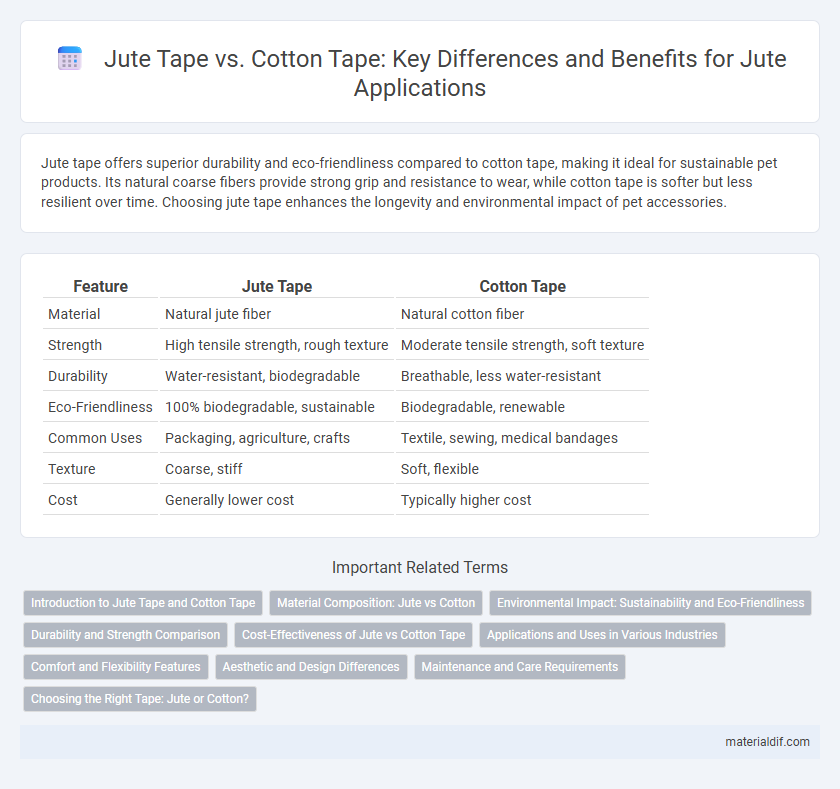Jute tape offers superior durability and eco-friendliness compared to cotton tape, making it ideal for sustainable pet products. Its natural coarse fibers provide strong grip and resistance to wear, while cotton tape is softer but less resilient over time. Choosing jute tape enhances the longevity and environmental impact of pet accessories.
Table of Comparison
| Feature | Jute Tape | Cotton Tape |
|---|---|---|
| Material | Natural jute fiber | Natural cotton fiber |
| Strength | High tensile strength, rough texture | Moderate tensile strength, soft texture |
| Durability | Water-resistant, biodegradable | Breathable, less water-resistant |
| Eco-Friendliness | 100% biodegradable, sustainable | Biodegradable, renewable |
| Common Uses | Packaging, agriculture, crafts | Textile, sewing, medical bandages |
| Texture | Coarse, stiff | Soft, flexible |
| Cost | Generally lower cost | Typically higher cost |
Introduction to Jute Tape and Cotton Tape
Jute tape is a natural fiber tape made from the long, soft vegetable fibers of the jute plant, known for its strength, biodegradability, and rustic appearance. Cotton tape, crafted from finely spun cotton fibers, offers softness, flexibility, and durability, making it ideal for sewing, crafting, and upholstery projects. Both tapes serve distinct purposes, with jute tape emphasizing eco-friendly packaging and crafting, while cotton tape is preferred for textile applications requiring gentle, durable material.
Material Composition: Jute vs Cotton
Jute tape is made from natural fibers of the jute plant, offering a coarse texture and high tensile strength ideal for packaging and crafting. Cotton tape, derived from soft cotton fibers, provides flexibility and a smooth surface preferred in apparel and medical applications. The choice between jute and cotton tape depends on durability needs, environmental impact, and application-specific requirements.
Environmental Impact: Sustainability and Eco-Friendliness
Jute tape offers superior sustainability due to its biodegradable fibers and low-impact cultivation, making it a highly eco-friendly alternative to cotton tape, which often requires intensive water and pesticide use. The biodegradability of jute tape ensures minimal environmental footprint, as it decomposes naturally without leaving harmful residues. Choosing jute tape supports sustainable agriculture practices and reduces plastic pollution associated with synthetic tape options.
Durability and Strength Comparison
Jute tape offers superior durability and tensile strength compared to cotton tape due to its natural fiber composition and rough texture, making it ideal for heavy-duty packaging and binding tasks. Cotton tape, while softer and more flexible, tends to wear out faster under stress and has lower resistance to abrasion and moisture. For applications requiring long-lasting performance and robust holding power, jute tape is the preferred choice over cotton tape.
Cost-Effectiveness of Jute vs Cotton Tape
Jute tape offers a more cost-effective solution compared to cotton tape due to lower raw material and production expenses. The natural availability and biodegradability of jute reduce overall costs while maintaining durability and strength. In bulk applications, jute tape provides significant savings without compromising on environmental sustainability or performance.
Applications and Uses in Various Industries
Jute tape excels in packaging, agriculture, and crafts due to its biodegradable properties and strength, making it ideal for eco-friendly bundling and plant tying. Cotton tape finds widespread use in medical, tailoring, and upholstery industries because of its soft texture and flexibility, providing comfort and durability in bandaging, garment construction, and furniture trimming. Both tapes serve distinct roles across sectors, with jute favored for sustainable solutions and cotton preferred for applications requiring gentle, adaptable materials.
Comfort and Flexibility Features
Jute tape offers natural breathability and a coarse texture, providing moderate comfort but limited flexibility compared to cotton tape. Cotton tape is softer and more pliable, enhancing comfort and allowing greater movement without irritation. For applications requiring superior comfort and flexibility, cotton tape is often preferred over jute tape.
Aesthetic and Design Differences
Jute tape offers a rustic, natural aesthetic with coarse fibers and an earthy tone, making it ideal for vintage, eco-friendly, and craft designs. Cotton tape provides a smoother texture and softer appearance, lending itself to clean, polished, and versatile applications in fashion and upholstery. The choice between jute and cotton tape significantly impacts the visual appeal and tactile experience of finished products.
Maintenance and Care Requirements
Jute tape requires minimal maintenance due to its natural resistance to moisture and pests, making it ideal for outdoor and heavy-duty uses. Cotton tape demands more frequent washing and careful drying to prevent shrinkage and mildew, especially in humid environments. Both tapes benefit from air drying and avoiding prolonged exposure to direct sunlight to extend their durability.
Choosing the Right Tape: Jute or Cotton?
Jute tape offers natural biodegradability and superior strength, making it ideal for eco-friendly packaging and gardening applications, while cotton tape provides greater softness and flexibility, perfect for fabric crafts and medical uses. Choosing between jute and cotton tape depends on the required durability, environmental impact, and tactile qualities specific to the task. Evaluating factors like tensile strength, moisture resistance, and texture ensures the right tape enhances both performance and sustainability.
Jute Tape vs Cotton Tape Infographic

 materialdif.com
materialdif.com